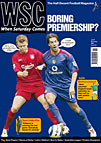 Few players have made more impressive starts at a club than scoring 30 goals in half a season; few have then done less to earn their wages, writes Gordon Cairns
Few players have made more impressive starts at a club than scoring 30 goals in half a season; few have then done less to earn their wages, writes Gordon Cairns
Marco Negri’s four years at Glasgow Rangers is one of the strangest episodes in the club’s history. Signed from Perugia for £3.5 million, the Italian striker scored 30 goals before Christmas in 1997-98, then barely made another appearance as he saw out the remainder of his four-year, £18,000-a-week contract.
Since Negri’s fall from grace, it has taken Rangers almost a decade and tens of millions of pounds to replace him. Successive managers have spent heavily on strikers such as Ronald de Boer, Michael Mols, Shota Arveladze, Jonatan Johansson and Claudio Caniggia, and an incredible £12.5m on Tore Andre Flo, but none could supply the quantity of goals Negri did. So what happened to cause a rift that saw a player mentioned by Italy coach Cesare Maldini as a possible striker for his France 98 World Cup squad, being forced to play for the youth team against East Fife the following season?
Negri had scored 15 Serie A goals in a relegation season for Perugia, his sixth different club in nine seasons as a professional in Italy, before being signed by Walter Smith to replace the aging Ally McCoist. Negri made his presence felt immediately, hitting an incredible 23 goals in his first ten games, including five against Dundee United in his second home match and four against Dunfermline.
Negri seemed to be the consummate poacher, whose goals typically came from a stab home from eight yards out or a glancing header in the penalty box. This was not to say he could not score spectacular goals, however. Two of the five against Dundee United were crackers, one similar to Paul Gascoigne’s Euro 96 effort against Scotland and another a clever lob over the keeper.
Not noted for his pace, Negri took conserving energy to the extreme by not even celebrating his goals beyond a handshake, even after scoring five. One writer in a Rangers fans website has suggested that his team-mates would compensate by congratulating the provider instead.
Negri’s form was so good in a usually derided league that Italian clubs made approaches to take him home, but were rejected, which probably still causes Rangers chairman David Murray to wake up crying.
Negri’s incredible run of goals was obviously aided by playing against weaker sides and being provided by Paul Gascoigne and Brian Laudrup; it was significant that he didn’t score after the preliminary rounds in Rangers’ abortive European campaigns in the Champions League and UEFA Cup. His most important goal was the opener against Celtic at Parkhead, which was a critical game in the ten-in-a-row campaign, but Celtic equalised with a few minutes to go
Negri received an eye injury playing squash against compatriot Sergio Porrini and managed only two more goals before the end of the season. Rumours circulated that being bawled out by the manager Walter Smith in front of the first team in the dressing room was enough to make the Italian decide to withdraw his services. Shortly after what proved to be his last game of the season against Hibernian, Smith was asked by the press whether Negri was left out of the squad because he was injured. “No,” Smith snapped and walked away.
The next Rangers manager, Dick Advocaat, fared equally dismally in trying to get Negri to play for the club. He was lent out to Vicenza as the club tried to get some return on him, but returned, carrying a back injury, after falling out with the Italian club. After four years of sitting in the stand, Negri eventually left for Bologna.
Negri’s continued absence from the Rangers first team was never satisfactorily explained, nor his determination to see out his lucrative contract. In a rare interview, given in his glorious half season at Ibrox, this most enigmatic of players may have let slip his long-term intentions. He said: “As far as I am concerned I shall be here until my contract ends and then I shall look at things, but that is a long way off. I signed a deal to stay with Rangers for four years and nothing that has happened here in Glasgow so far has changed my mind about that.”
Perhaps the last word should go to Walter Smith. Asked about Rino Gattuso before the Italy-Scotland match last March, he reflected on all the Italian players he brought to Ibrox. “Like, Rino, they were all good professionals – well, almost.”
From WSC 225 November 2005. What was happening this month